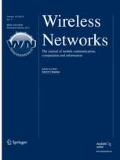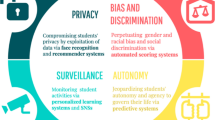Abstract
Ideological and political courses have received little attention from students, and some students believe that ideological and political courses are incredibly uninteresting, resulting in the evaluation of ideological and political education that cannot be carried out effectively. Evaluating such education is of extreme significance in advancing the scientification of ideological and political education. Speaking of scientification, the advancement of 5G technology has sparked a surge in intelligent terminal devices and the emergence of online education, which applies to ideological and political education. However, traditional networks cannot provide enough bandwidth support for online ideological and political education due to the explosive development of mobile data traffic. Fortunately, the emergence of edge computing effectively solves this issue. Therefore, in this paper, we jointly make offloading and assisted cache decisions in 5G-oriented edge computing scenarios and formulate the optimization problem as minimizing the worst-case energy consumption of users to ensure the fairness of task processing. Additionally, particle swarm optimization is proposed to solve the minimization problem for the minimization problem. The experimental results show that the proposed scheme has a good performance in energy consumption compared with the three baselines, and it has achieved a high quality of experience. Most strikingly, the proposed scheme optimizes students' energy consumption and latency using terminals, provides good support for online teaching, and lays a foundation for teaching evaluation.






Similar content being viewed by others
Data availability
The data used to support the findings of this study is available from the corresponding author upon the reasonable request.
References
Verma, A., Singh, A., Lughofer, E., et al. (2021). Correction to: Multilayered-quality education ecosystem (MQEE): An intelligent education modal for sustainable quality education. Journal of Computing in Higher Education, 33, 580. https://doi.org/10.1007/s12528-021-09293-z
Wang, Y. (2020). Analysis on the construction of ideological and political education system for college students based on mobile artificial intelligence terminal. Soft Computing, 24, 8365–8375.
Qi, F., Chang, Y., Ramesh, K., et al. (2021). Online and offline teaching connection system of college ideological and political education based on deep learning. Progress in Artificial Intelligence. https://doi.org/10.1007/s13748-021-00268-w
Wang, S., & Zhang, T. (2019). Research on innovation path of school ideological and political work based on large data. Cluster Computing, 22(Suppl 2), 3375–3383.
Rui, Z. (2022). Research on evaluation system of ideological and political education of college students based on decision system. Soft Computing. https://doi.org/10.1007/s00500-022-07003-0
Jiang, H. (2021). Feature extraction method of students’ ideological and political learning behavior based on convolutional neural network. In W. Fu, S. Liu, & J. Dai (Eds.), e-learning, e-education, and online training. eLEOT 2021. Lecture notes of the institute for computer sciences, social informatics and telecommunications engineering. (Vol. 390). Springer. https://doi.org/10.1007/978-3-030-84386-1_42
Liu, X., Faisal, M., & Alharbi, A. (2022). A decision support system for assessing the role of the 5G network and AI in situational teaching research in higher education. Soft Computing. https://doi.org/10.1007/s00500-022-06957-5
Rao, S. K., & Prasad, R. (2018). Impact of 5G technologies on smart city implementation. Wireless Personal Communications, 100, 161–176.
Qiao, Y., Yu, J., Lin, W., et al. (2018). A human-in-the-loop architecture for mobile network: From the view of large scale mobile data traffic. Wireless Personal Communications, 102, 2233–2259.
Kim, D. Y., & Kim, S. (2021). Incoming traffic control of fronthaul in 5G mobile network for massive multimedia services. Multimedia Tools and Applications, 80, 34443–34458.
Scavarelli, A., Arya, A., & Teather, R. J. (2021). Virtual reality and augmented reality in social learning spaces: A literature review. Virtual Reality, 25, 257–277.
Hamilton, D., McKechnie, J., Edgerton, E., et al. (2021). Immersive virtual reality as a pedagogical tool in education: A systematic literature review of quantitative learning outcomes and experimental design. Journal of Computers in Education, 8, 1–32.
Chung, S., Cheon, J., & Lee, K. W. (2015). Emotion and multimedia learning: An investigation of the effects of valence and arousal on different modalities in an instructional animation. Instructional Science, 43, 545–559.
Çakıroğlu, Ü., Aydın, M., Özkan, A., et al. (2021). Perceived learning in virtual reality and animation-based learning environments: A case of the understanding our body topic. Education and Information Technologies, 26, 5109–5126.
Ding, C., Zhou, A., Huang, J., et al. (2019). ECDU: An edge content delivery and update framework in mobile edge computing. Journal on Wireless Communications and Networking, 2019, 268. https://doi.org/10.1186/s13638-019-1590-2
Niu, D., Li, Y., Zhang, Z., et al. (2022). A service collaboration method based on mobile edge computing in internet of things. Multimedia Tools and Applications. https://doi.org/10.1007/s11042-022-13394-x
Gao, H., & Liu, J. (2022). Editorial: Intelligent collaboration under internet of things and mobile edge computing. Mobile Networks and Applications. https://doi.org/10.1007/s11036-022-01998-4
Beck, M., Feld, S., Linnhoff-Popien, C., et al. (2016). Mobile edge computing. Informatik Spektrum, 39, 108–114.
Liu, X., Zhao, X. T., & Starkey, H. (2021). Ideological and political education in Chinese Universities: Structures and practices. Asia Pacific Journal of Education. https://doi.org/10.1080/02188791.2021.1960484
Yu, C. Y. (2019). Innovative methods of ideological and political education for college students based on ideological cognition science. Educational Sciences-Theory & Practice, 18, 2989–2998.
Bai, X. Y. (2019). Research on the performance evaluation of ideological and political education of college students based on fuzzy comprehensive evaluation. Educational Sciences-Theory & Practice, 18, 2394–2402.
Zhang, B., Velmayil, V., & Sivakumar, V. (2021). A deep learning model for innovative evaluation of ideological and political learning. Progress in Artificial Intelligence. https://doi.org/10.1007/s13748-021-00253-3
Wu, Z. G. (2019). An improved performance evaluation index system and fuzzy evaluation model of college students’ ideological and political education. Educational Sciences-Theory & Practice, 18, 1558–1567.
Ding, Y. X., Zeng, W., & Ning, Z. (2022). Quality evaluation of ideological and political education in universities based on BP neural network. Computational Intelligence and Neuroscience. https://doi.org/10.1155/2022/8336895
Zhou, S., & Jadoon, W. (2021). Jointly optimizing offloading decision and bandwidth allocation with energy constraint in mobile edge computing environment. Computing, 103, 2839–2865.
Gopi, R., Suganthi, S. T., Rajadevi, R., et al. (2021). An enhanced green cloud based queue management (GCQM) system to optimize energy consumption in mobile edge computing. Wireless Personal Communications, 117, 3397–3419.
Bacanin, N., Antonijevic, M., Bezdan, T., et al. (2022). Energy efficient offloading mechanism using particle swarm optimization in 5G enabled edge nodes. Cluster Computing. https://doi.org/10.1007/s10586-022-03609-z
Wang, Y., Zhu, H., Hei, X., et al. (2019). An energy saving based on task migration for mobile edge computing. Journal on Wireless Communications and Networking, 2019, 133. https://doi.org/10.1186/s13638-019-1469-2
Li, S., Zhang, N., Jiang, R., et al. (2022). Joint task offloading and resource allocation in mobile edge computing with energy harvesting. Journal of Cloud Computing, 11, 17. https://doi.org/10.1186/s13677-022-00290-w
Li, C., Cai, Q., & Luo, Y. (2021). Multi-edge collaborative offloading and energy threshold-based task migration in mobile edge computing environment. Wireless Networks, 27, 4903–4928.
Yang, B., & Cheng, L. (2013). Study of a new global optimization algorithm based on the standard PSO. Journal of Optimization Theory and Applications, 158, 935–944.
Xinke, L., Huijun, J., & Xin, Z. (2019). Human action tracking design of neural network algorithm based on GA-PSO in physical training. Cluster Computing, 22(Suppl 2), 4149–4155.
Farahnakian, M., Razfar, M. R., Moghri, M., et al. (2011). The selection of milling parameters by the PSO-based neural network modeling method. International Journal of Advanced Manufacturing Technology, 57, 49–60.
Pan, I., Korre, A., Das, S., et al. (2012). Chaos suppression in a fractional order financial system using intelligent regrouping PSO based fractional fuzzy control policy in the presence of fractional Gaussian noise. Nonlinear Dynamics, 70, 2445–2461.
Chunlin, L., & Zhang, J. (2020). Dynamic cooperative caching strategy for delay-sensitive applications in edge computing environment. The Journal of Supercomputing, 76, 7594–7618.
Kim, J., & Jin, M. (2016). Synchronization of chaotic systems using particle swarm optimization and time-delay estimation. Nonlinear Dynamics, 86, 2003–2015.
Choudhary, S., Sugumaran, S., Belazi, A., et al. (2021). Linearly decreasing inertia weight PSO and improved weight factor-based clustering algorithm for wireless sensor networks. Journal of Ambient Intelligence and Humanized Computing. https://doi.org/10.1007/s12652-021-03534-w
Funding
There is no funding support for this article.
Author information
Authors and Affiliations
Corresponding author
Ethics declarations
Conflict of interest
Rui Ma and Xuefeng Chen declare that they have no conflict of interest.
Ethical approval
This article does not contain any studies with human participants or animals performed by any of the authors.
Additional information
Publisher’s Note
Springer Nature remains neutral with regard to jurisdictional claims in published maps and institutional affiliations.
Rights and permissions
Springer Nature or its licensor (e.g. a society or other partner) holds exclusive rights to this article under a publishing agreement with the author(s) or other rightsholder(s); author self-archiving of the accepted manuscript version of this article is solely governed by the terms of such publishing agreement and applicable law.
About this article
Cite this article
Ma, R., Chen, X. Intelligent education evaluation mechanism on ideology and politics with 5G: PSO-driven edge computing approach. Wireless Netw 29, 685–696 (2023). https://doi.org/10.1007/s11276-022-03155-x
Accepted:
Published:
Issue Date:
DOI: https://doi.org/10.1007/s11276-022-03155-x




